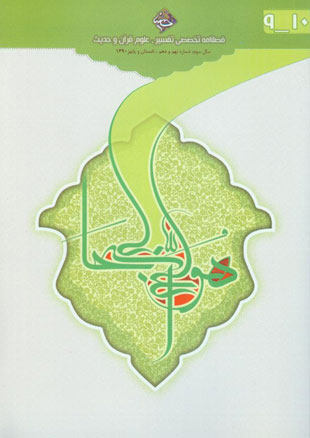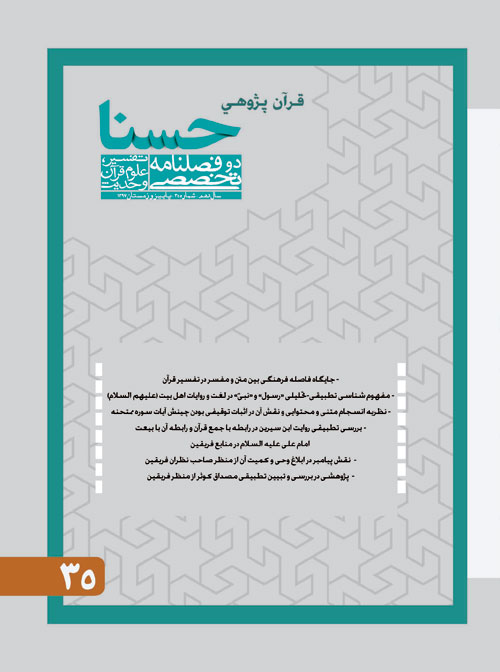فهرست مطالب

نشریه قرآن پژوهی حسنا
پیاپی 9-10 (تابستان و پاییز 1390)
- 228 صفحه، بهای روی جلد: 12,000ريال
- تاریخ انتشار: 1390/11/01
- تعداد عناوین: 9
-
صفحه 114
-
صفحه 211
-
Page 21Qur’an recitations authenticity and succession is one of the important issues in recitation science. It has been taken into account by Qur’anic scholars from the past times. Each of them has own different reasons and documents. According to this paper recitations succession by Prophet Muhammad (SA) undertook documented recitations succession. However, someone believed in Qur’an succession as recitation that it isn’t true. Certainly, Qur’an and succession have a different nature. Also, succession of sevenfold letters hadith neither explicitly nor implicitly don’t adapt to recitations succession because sevenfold letters aren’t the same as sevenfold recitation.Keywords: Quran recitations, succession, authenticity terms, narrative document, sevenfold letters
-
Page 63Obviously, Arabic literature has promoted due to Holy Quran and has become one of the most highlighted global literatures. The impact of its words and meanings on poet works and Muslim literati have been taken into consideration by researchers. Abu Abdollah Mohammad ibn Ahmad ibn Abdollah named Mofajja' Basari (327 A.H.) was one of shitte elite poets in the Second Abbasi age (4th century) in the literature arena, his ode so-called Aleshbah made him a star in the Arabic poem sky. By a brief look to this 160 verses ode, we will find out his familiarity with Quran and his description about Imam Ali (AS) including Quran verses elusion, quotation, and undertaking. Quranic verse's manifestation in Aleshbah ode will be discussed and dealt with the translation and analysis of poem verses and Quranic verses in this paper.Keywords: Holy Quran, Imam Ali (AS), Mofajja Basari, Aleshbah ode
-
Page 85A proper understanding of profound meaning of Qur’anic verses requires the recognition of Qu’ranic words. Since current century has observed the appearance of linguistics fields and various philosophies, on the other hand, numerous scholars have focused on Qur’an as a lingual issue, this linguistic-oriented research can be effective because Qur’anic aspects knowledge which is one of Qur’anic sciences branches, has an effective role in finding out semantics. In fact, every word in accordance with linguistics is a sign to find its meaning aspects. The word ''Law'' and its connotations are one of the words applied in the contemporary society as well as in human being's life, increasingly. Study of the word ''Law'' and its synonyms in Qur’an will be discussed in this paper by a linguistics-oriented approach.
-
Page 114Every government has its own structure and ingredients. The structure of Islamic government and its ingredients, and nation's function and its role in this issue will be analyzed in this paper. Initially, it distinguishes the right of government in the Islamic approach with respect to verses and traditions, and then, it will explain general structure of Islamic government which it has 3 main elements in the Islamic political thought whether in the presence or in the occultation of Infallible Imam (a.s.). These 3 main elements are: leadership, government, and nation. Also, we will discuss government elements such as executive, legislative and judicial organization. This paper mainly refers to leadership, its features, empowerments, and qualifications and ultimately, it will discuss nation's role and function in the Islamic government.Keywords: Islamic government, government elements, religious government, government laws, law making mechanism, Islamic leadership, justice, ijtihad (Islamic jurisprudential investigations), insight, kinds of leadership
-
Page 150According to Qur’an, the first commentator was Prophet Muhammad (s.a.). Islamic scholars contemporary to the companions of Prophet Muhammad (s.a.) consistently believe that Qur’anic text needs commentary. As a result, there have been different commentaries of Holy Qur’an hitherto. But recently, some of intellectuals believe that every personal understanding and commentary is valid. This paper is trying to reply this question whether Qur’an needs commentary or not. It represents a detailed answer in order to void the theory of several recitations
-
Page 164Advantages of identifying time and place of descending Qur’anic verses and lack of Prophet Evidences caused Qur’an investigators were following to access approaches to Mecca and Medina's verses. These approaches are as follows: narrative, comparative, and Islamic Shar`iah. This paper will discuss these approaches, details, and their samples historically in order to access kinds of verses and chapters accurately.Keywords: Mecca verse, Medina verse
-
Page 178Recognition the last Divine Scripture and Prophet Muhammad (SA) 's eternal miracle is due to a real recognition of every Qur’an words. It is accomplished by focusing on descent age's conditions including audience, time and place of verses descent and so on. One of these words is ''Expiration'' (مىث). We must find out its meaning before and after the descent. Originally, it means ''Death'' which is its well-known meaning. At first, it referred to separations of spirit from body because this event had been tangible to human being. This word seems had not a remarkable transformation over the time. However, it had several virtual meaning (e. g. misleading, ignorance, and …) after its descent. Also, it has been divided into some kinds of idiomatic meanings by mystics. We are going to deal with its historical semantics, and then, its transformation process as well as its Qur’anic semantics will be discussed.Keywords: Expiration, death, semantics, Quran


